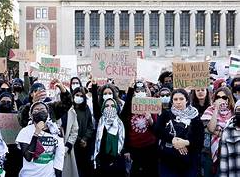Divisions over Israel-Palestine have morphed into a fight for free speech and thrown the Ivy League university into crisis.
In a classroom tucked away in Fayerweather Hall on Columbia University’s campus in New York City, two students are engaged in a passionate debate, a reflection of the wider tensions surrounding the Israel-Palestine conflict that have enveloped the Ivy League university. One of the students, Mohsen Mahdawi, a Palestinian born in the occupied West Bank, takes issue with a classmate’s interpretation of the term “intifada.” He contends that the Palestinian perspective is misunderstood, defending it not as an expression of violence, but as a legitimate form of resistance against oppression.
This exchange is just one example of the deep divisions now plaguing Columbia, where the Israel-Palestine debate has evolved beyond a mere geopolitical issue into a more profound struggle over freedom of speech, academic discourse, and the boundaries of acceptable expression. As protests, petitions, and public condemnations continue to ripple through the campus, the university finds itself in a crisis that transcends the original topic of Israel and Palestine. The debate has become a battleground for ideological control, with students, faculty, and administrators alike caught in the crossfire.
For many pro-Palestinian students, the current political moment represents an urgent call to action. They argue that the university must stand in solidarity with the Palestinian people, drawing attention to the Israeli occupation of Palestinian territories, and calling for divestment from companies that profit from this conflict. For them, the fight for Palestinian rights is intrinsically linked to the fight for freedom of speech on campus, as they push back against what they see as censorship and repression of their views.
On the other hand, pro-Israel students and their supporters contend that certain expressions of pro-Palestinian sentiment on campus veer into anti-Semitism, accusing some student groups of making inflammatory, unfounded statements that delegitimize the existence of the state of Israel. These tensions have prompted an escalating war of words, with accusations of anti-Semitism often leveled at those who criticize Israeli policies, while some argue that the university is not doing enough to protect free speech for those supporting Palestinian causes.
At the heart of the crisis lies the question of how universities should balance the competing interests of free expression and the protection of marginalized groups. Columbia’s administration has faced mounting pressure to navigate these fraught discussions, with some urging for stronger condemnation of hate speech and others defending the right of students to voice their views, however controversial. The challenge is further complicated by the university’s diverse student body, which includes students from both Israeli and Palestinian backgrounds, each with their own deeply held convictions about the conflict.
As Columbia grapples with these tensions, the broader question of how universities across the United States handle discussions surrounding Israel and Palestine remains an issue of national importance. The conflict has ignited debates not only about the future of higher education but also about the very nature of public discourse in an increasingly polarized society. The outcome of these battles on campuses like Columbia may have lasting consequences, shaping the future of free speech and activism in America for years to come.
In the meantime, the students at the heart of this crisis continue to engage in heated debates, trying to make sense of their positions in a world that seems increasingly divided. For some, the fight for Palestinian rights is a cause that transcends borders, while for others, the battle is about ensuring that Jewish students feel safe and supported on campus. In the end, the divisions at Columbia may offer a snapshot of the broader cultural and political divides that are playing out across the country, with no easy resolution in sight.

